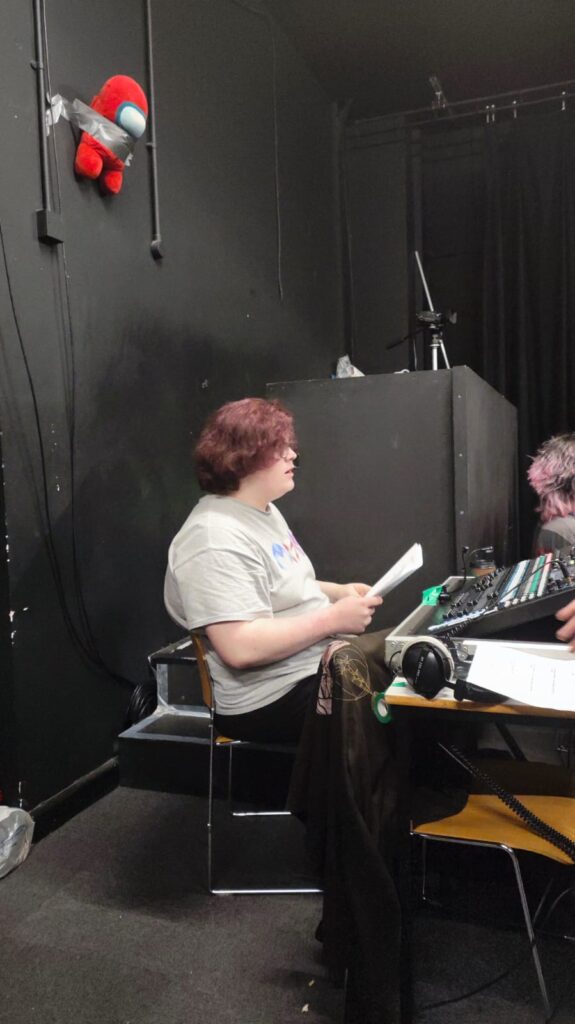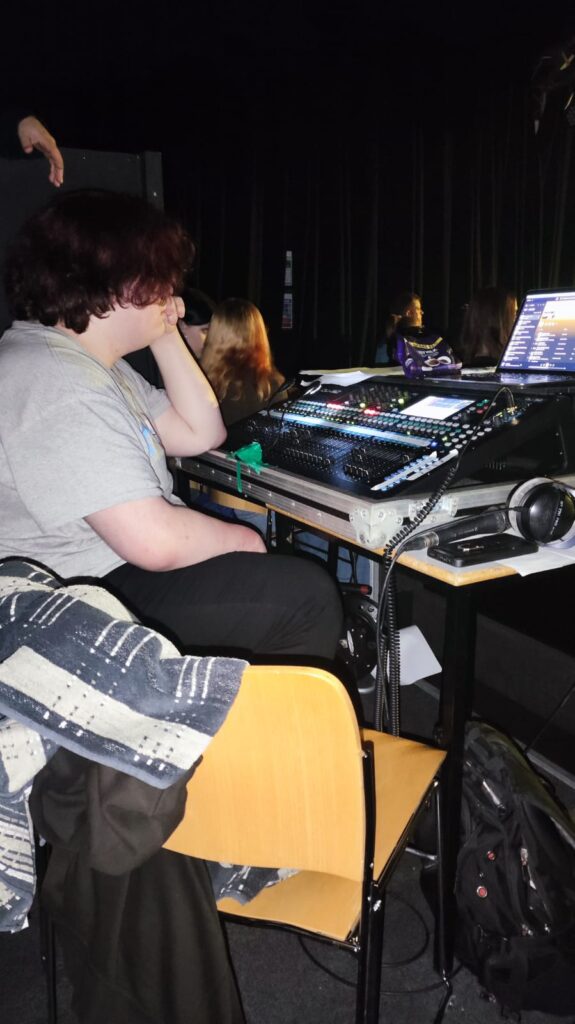When I think back to last year’s live performance, where I said I would like to perform live again, I think it was the right decision this year to switch to live Production and Mixing; this was a great addition to my skills. As I was struggling with my Mental Health,
Thursday, October 17th, was the live performance. I was still terrified as I was mixing decks for the other students’ live performances and didn’t want to mess this up for them.
Although I was no longer performing as part of the band, I still had to work with the other students to understand the setlist they would perform. This allowed me to ensure I was still working with my peers. Although I struggle to work in groups, I realise I can’t do everything independently. I have to accept that other people have differing viewpoints.

I reviewed the setlist to ensure I was ready for the performances. I was familiar with most of these songs, and so I had a genuine knowledge of what the sound levels needed to be. The questions I asked myself were: what was the focus of the song? What is it known for? Bass, vocals, guitar? If I answered these questions beforehand, I’d know what I needed to do for which song. I had already done a performance/dress rehearsal the afternoon of the gig to test levels.

From what I remember of the performance, levels weren’t too much of an issue. Due to sorting them out in the dress rehearsal prior, I hadn’t much to do. The most I would do in the gig was turn up levels on monitors for my peers and give them the appropriate mix of sound to achieve a flawless performance. For the most part, this was achieved – our range of technology typically limits us, as we don’t have IEMs to work with, and instead regular monitors.
When things were going great and the audience was all enjoying the songs, I was sitting there looking out for any visual indicator or hand gestures from my peers to make sure they were happy with their levels. With my role, I am responsible for not only the sound coming back to the audience but also making sure the musicians can hear themselves.
I did some further reading into the course, and we will have to use models to reflect on our work in the future. Gibbs Models are a form of reflection, and so as part of this analysis, I will attempt to utilise this model.
Feelings
My feelings on this project were mixed. Due to a rapidly declining state of Mental Health, I had to drop my position as the drummer for Wendigo, a band I was going to perform with and do three songs with. I have been struggling since, and getting support for Mental Health is a challenge with being in college, especially since I feel my time is skewed. My assignments are rushed (on further look, they aren’t too bad, but I am prone to in-the-moment outbursts), so the change of pace helped me in the short term, and I will consider Mixing/Production for furthering my career and education. These are significantly easier on me as a person.
Evaluation
The bands were composed of a few people that I do not work well with socially, but due to my position as the Sound Engineer, I found cooperation in every aspect. I tried and succeeded in putting on a “customer service” smile, taking things in stride, and giving it my all to stop any issues from popping up. Only when we weren’t performing and practising did I find time to complain aptly.
One issue that I had was people trying to turn amplifiers up or down on the stage itself which could severely damage equipment if not coordinated. Since I was responsible for all speakers and microphone levels, if someone turned their amp up to max volume as I was sound checking, severe hearing damage could be caused to all with or without ear protection, so I made it abundantly clear to those performing that if they wanted to hear more of their instrument, they consult me, and only me.
Analysis
Reflecting on the experience, I realized that my preparation and planning were not as thorough as they could have been. I should have allocated more time for troubleshooting and unexpected challenges. I also learned the importance of communication with the band. Regular check-ins and feedback sessions helped ensure that we were on the same page and allowed me to make adjustments based on their input.
Conclusion
In conclusion, I need to improve personally on my organisational skills and prioritise tasks to complete them on time, as I will need this in a working professional environment. While I had a good idea of what I needed to do, I always had to double check with a tutor because I struggle with independent action, so having someone to rely on was a need for me. For the night of the performance, I had to ask Lewis Blofield to go up to the stage to sort any tech related issues. All in all, I believe this route in the industry will be beneficial to me and that I can do some real good for myself if I take it up as a career.
action plan
For my next Project 2 – Community Music and Professional Development, and others, I will look at the following:
- Evaluation: Start my evaluation early, writing down my thoughts as I go along. This will help reduce stress, so I am using a model like GIBBS to reflect on it.
- Professional Development: Look at options after college and university application.
- Improve communication: Look at my skills to ensure I can contribute to a team and improve my communication skills.
- Referencing & Checking: Think more about referencing what I write. I tend to write what I think and don’t check after, use tools to help me like Grammarly
I hope the above will help me with the upcoming projects and allow me to achieve a higher grade.